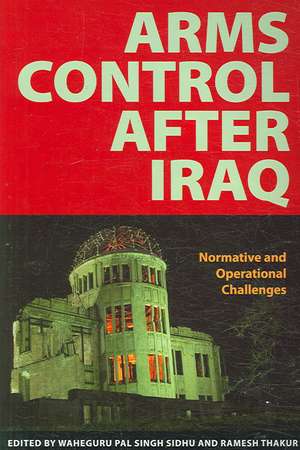Arms Control after Iraq: Normative and Operational challenges
Editat de Waheguru Pal Singh Sidhu, Ramesh Thakuren Limba Engleză Paperback – 15 dec 2006
Although no weapons of mass destruction were ever found in Iraq, the international community remains preoccupied with the threat of proliferation and use of WMDs. Some countries, while publicly supporting the international Treaty on the Nonproliferation of Nuclear Weapons (NPT), could either covertly develop a full-fledged weapons capability or acquire all the materials and expertise needed for a weapons program and then withdraw from the treaty. There is reason to fear the erosion and possible collapse of the whole NPT regime over the longer term. Treaties already negotiated and signed could unravel, nuclear weapons testing could resume, and a growing list of countries currently without nuclear weapons programs could start them up if they feel sufficiently threatened by their nuke-possessing neighbors. This book discusses issues regarding the use of force in general, the implications of a shift in the use of nuclear weapons from deterrence to coercion, and a focus on nonproliferation to the neglect of disarmament. The authors discuss the role of the United Nations in controlling the spread and use of WMDs, the regional dynamics of proliferation concerns in Northeast Asia and the Middle East, and the threats posed by the possible acquisition of nuclear weapons and missiles by nonstate actors.
Preț: 259.91 lei
Preț vechi: 274.94 lei
-5% Nou
Puncte Express: 390
Preț estimativ în valută:
49.74€ • 53.18$ • 41.47£
49.74€ • 53.18$ • 41.47£
Comandă specială
Livrare economică 27 martie-10 aprilie
Doresc să fiu notificat când acest titlu va fi disponibil:
Se trimite...
Preluare comenzi: 021 569.72.76
Specificații
ISBN-13: 9789280811315
ISBN-10: 9280811312
Pagini: 464
Dimensiuni: 152 x 229 x 24 mm
Greutate: 0.7 kg
Editura: Brookings Institution Press
Colecția United Nations University Press
ISBN-10: 9280811312
Pagini: 464
Dimensiuni: 152 x 229 x 24 mm
Greutate: 0.7 kg
Editura: Brookings Institution Press
Colecția United Nations University Press
Notă biografică
Waheguru Pal Singh Sidhu is a faculty member at the Geneva Centre for Security Policy. Ramesh Thakur is a distinguished fellow at the Centre for International Governance Innovation and professor of political science at the University of Waterloo, Canada. He previously served as senior vice-rector of the United Nations University and assistant secretary general of the United Nations.
Descriere
Although no weapons of mass destruction were ever found in Iraq, the international community remains preoccupied with the threat of proliferation and use of WMDs. Some countries, while publicly supporting the international Treaty on the Nonproliferation of Nuclear Weapons (NPT), could either covertly develop a full-fledged weapons capability or acquire all the materials and expertise needed for a weapons program and then withdraw from the treaty. There is reason to fear the erosion and possible collapse of the whole NPT regime over the longer term. Treaties already negotiated and signed could unravel, nuclear weapons testing could resume, and a growing list of countries currently without nuclear weapons programs could start them up if they feel sufficiently threatened by their nuke-possessing neighbors. This book discusses issues regarding the use of force in general, the implications of a shift in the use of nuclear weapons from deterrence to coercion, and a focus on nonproliferation to the neglect of disarmament. The authors discuss the role of the United Nations in controlling the spread and use of WMDs, the regional dynamics of proliferation concerns in Northeast Asia and the Middle East, and the threats posed by the possible acquisition of nuclear weapons and missiles by nonstate actors.
